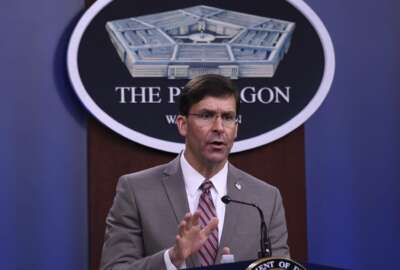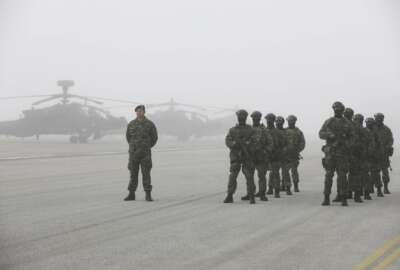
DoD to extend stop movement order through June 30
Defense officials say the new restrictions, though longer, will allow for more liberal exceptions. But they released few details on what those exceptions would be.
The Pentagon said on Saturday that it planned to extend many of the sweeping travel restrictions that are now in place for its personnel until June 30 — more than a month and a half beyond their current expiration date.
Defense Secretary Mark Esper will sign the latest version of the stop movement order on Monday, said Matthew Donovan, the undersecretary of Defense for personnel and readiness. Although the new restrictions will be longer in duration, he said they would take a more “liberal” approach to exceptions.
In particular, the latest rules will begin allowing for at least some overseas military deployments and redeployments — activities which have been mostly on hold since the current travel policy went into place on March 25.
“You’ll see that it’s little bit looser, because we know more about COVID-19 and we can get projections on potential hotspots, and we have more information from nations where troops would be moving to,” Donovan told reporters on a conference call. “It will also be more liberal in the waivers that will be granted. It’s such a situation-by-situation occurrence that we have to examine the whole circuitous line of transportation and make sure that we can maintain the secretary’s priorities throughout the entire situation.”
As of now, Donovan said the military services are moving personnel around the world at about 10% of their normal rate. It is unclear how much that might increase under the new orders, which have already arrived at Esper’s desk.
Esper had previously signaled that the restrictions would be extended beyond the current expiration date of May 11. But for now, relatively little is known about the ways in which the new policy will “loosen” the restrictions.
Despite being repeatedly pressed by reporters to provide more details on what the new policy will entail, Defense officials declined to do so ahead of Esper’s formal signature on Monday, even though he has already told subordinates he approves of the revisions.
Donovan suggested, however, that the new date of June 30 is not set in stone. He said Esper will reevaluate the situation every 15 days, and may lift the restrictions before that if conditions allow. And like under the current restrictions, DoD will allow for waivers for mission-essential travel, as well as for personal hardship and humanitarian reasons.
The new order is unlikely to change DoD’s policies for leave travel. Donovan said the Pentagon will restrict military members to only “local” leave.
It’s less clear what the new policy will mean for permanent change of station (PCS) travel within the U.S. The latest order would push the travel restrictions well into the military’s peak summer PCS season, when about 100,000 military members and families move during a normal year.
Donovan said the military services would make exceptions to the restrictions for “must movers,” and that the department is working on policies that would provide some relief to service members who are financially affected by the restrictions, such as those who have already signed a lease at their new duty station and may end up paying for two homes on opposite ends of the country.
“We’re making sure that the services understand all their authorities for paying. There are situations where it’s no fault of the member,” he said. “Under the Servicemembers’ Civil Relief Act, there are, a lot of times, clauses where military orders are exempted, and this is a valid military order. But it’s going to be sort of a hands on approach after the service has come up with their priority movers. And it will be a hand massage process because we have to examine where they’re leaving from, what mode of transportation they’re going to use throughout their trip, and then the ability of the installation on the other end to receive them and what their local conditions are.”
Copyright © 2025 Federal News Network. All rights reserved. This website is not intended for users located within the European Economic Area.
Jared Serbu is deputy editor of Federal News Network and reports on the Defense Department’s contracting, legislative, workforce and IT issues.
Follow @jserbuWFED
Related Stories






